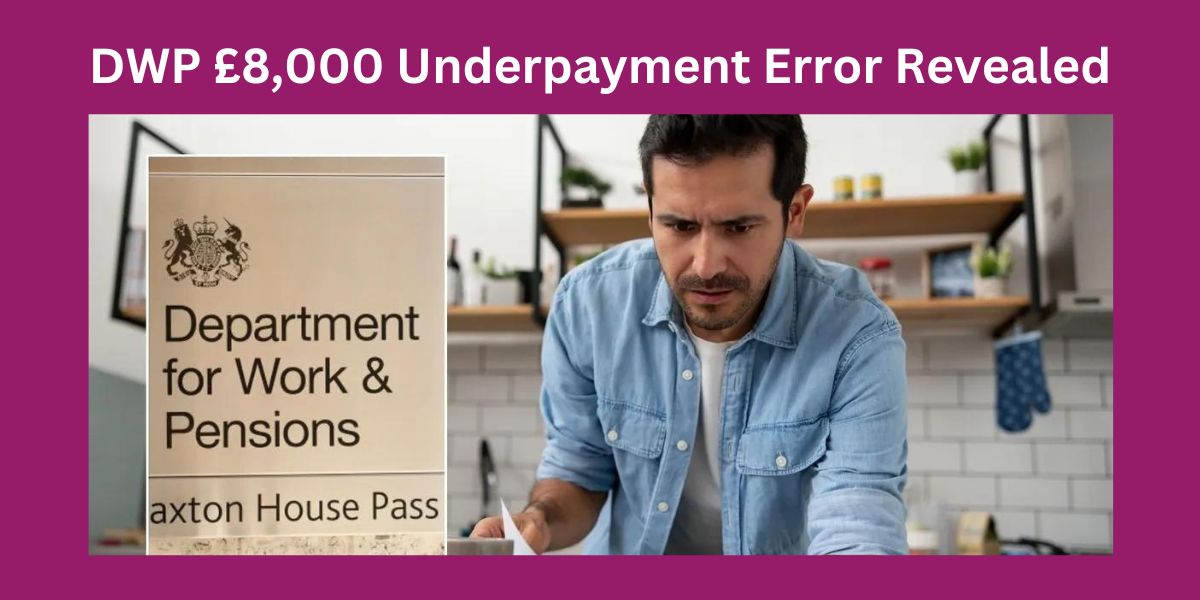Imagine expecting a certain amount of money each month to cover your essential expenses, only to find out that you’ve been underpaid for years. For many in the UK, this isn’t just a bad dream—it’s a reality. The Department for Work and Pensions (DWP) recently revealed an error in its payment system that has led to a massive underpayment to thousands of individuals. Some people are owed as much as £8,000! So, what exactly happened, who is affected, and how will they be repaid? Let’s dive into the details.
What is the DWP?
Before we get into the nitty-gritty of the underpayment error, let’s briefly touch on what the DWP is and why it’s so crucial. The Department for Work and Pensions (DWP) is the largest government department in the UK. It’s responsible for welfare, pensions, and child maintenance policy. Essentially, the DWP makes sure that millions of UK citizens receive the benefits they’re entitled to, whether they’re retired, unemployed, disabled, or low-income.
The Underpayment Error: What Went Wrong?
The Background of the Error
The underpayment error primarily revolves around the State Pension. For years, certain groups of people have been underpaid due to mistakes in the calculation of their benefits. The error was not due to individuals providing incorrect information, but rather a flaw in the system that the DWP uses to calculate payments.
Who is Affected?
Now, you might be wondering, “Could this be me?” Well, the underpayment mostly affects married women, widows, and those over 80 who fall under certain categories. Specifically, the groups that are most likely to have been underpaid include:
- Married Women: Those who should have been receiving a higher pension based on their husband’s National Insurance contributions.
- Widows: Women who were entitled to an increase in their State Pension after their husband’s death but didn’t receive it.
- Individuals Over 80: People who are entitled to a higher basic State Pension but were not correctly paid.
The Scale of the Issue
The DWP has estimated that around 200,000 people could be affected by this underpayment error. The underpayments go back as far as 1992 in some cases, which means that some individuals have been short-changed for nearly 30 years. The total amount that is owed could exceed £1 billion, with some individuals set to receive back payments of up to £8,000.
How Did This Happen?
System Errors and Oversights
So, how did such a massive mistake go unnoticed for so long? The issue seems to stem from a combination of outdated systems, human error, and a lack of proper checks. The DWP’s system failed to correctly flag cases where individuals were entitled to increased payments, leading to years of underpayments. Additionally, the complex nature of the UK pension system, with its various categories and entitlements, made it easier for these mistakes to slip through the cracks.
Lack of Communication
Another significant factor was the lack of communication between the DWP and the individuals affected. Many people had no idea they were being underpaid, and because they were unaware, they never questioned their payments. The DWP itself did not catch these errors until a recent internal review brought the issue to light.
The Repayment Process
Who Will Be Repaid?
If you’re reading this and thinking, “I might be one of those affected,” you’re probably wondering how the repayment process will work. The DWP has committed to identifying everyone who has been underpaid and repaying them the amount they are owed. This includes individuals who are currently receiving State Pension and those who may have been underpaid in the past but are no longer receiving payments.
How Much Will You Get?
The amount you’ll receive depends on how much you were underpaid and for how long. Some people may be owed only a small amount, while others could be entitled to thousands of pounds. The DWP is calculating these repayments on a case-by-case basis, so the amount will vary widely.
When Will You Be Repaid?
The DWP has begun the process of identifying those affected and has stated that repayments will be made as soon as possible. However, given the scale of the issue, this could take some time. The DWP aims to complete the process within the next few years, but they have not given a specific deadline. It’s a waiting game for those affected, but the good news is that repayments are coming.
How to Check If You’re Affected
Receiving a Letter from the DWP
The DWP is in the process of contacting everyone who has been underpaid. If you’re one of the affected individuals, you should receive a letter from the DWP explaining the situation and outlining the next steps. This letter will include details about how much you’re owed and when you can expect to receive your repayment.
Checking Your State Pension
If you believe you might have been underpaid but haven’t yet received a letter, it’s a good idea to check your State Pension. You can do this online through the UK government’s website or by contacting the DWP directly. They can provide you with a breakdown of your payments and help you determine if there’s been an error.
Seeking Independent Advice
For those who are unsure about their situation, seeking independent advice might be a good option. Organizations like Citizens Advice can provide guidance on what steps to take if you believe you’ve been underpaid. They can also help you navigate the sometimes complex process of dealing with the DWP.
The Impact of the Underpayment Error
Financial Strain on Individuals
The underpayment error has had a significant impact on many individuals, particularly those who rely heavily on their State Pension to cover daily expenses. For some, this underpayment could have meant years of financial strain, struggling to make ends meet without realizing they were entitled to more money.
Loss of Trust in the System
Beyond the financial impact, this error has also shaken many people’s trust in the system. The DWP is supposed to ensure that individuals receive the benefits they’re entitled to, and this massive error has led to a loss of confidence in their ability to do so. For many, this situation has raised concerns about what other mistakes might be lurking in the system, waiting to be discovered.
What the DWP is Doing to Fix the Issue
Implementing New Systems
In response to this underpayment error, the DWP has committed to making significant changes to prevent similar mistakes in the future. This includes implementing new systems and procedures designed to catch errors before they affect payments. They are also working to modernize their systems, which should help to reduce the likelihood of such errors occurring again.
Increased Oversight
The DWP has also promised increased oversight to ensure that all individuals receive the correct payments. This includes more frequent reviews of the system and stricter checks to catch any discrepancies. By increasing oversight, the DWP hopes to restore trust in their ability to manage the State Pension and other benefits.
The Role of the Ombudsman
What is the Ombudsman?
If you’re not satisfied with how the DWP handles your case, you can take your complaint to the Parliamentary and Health Service Ombudsman. The Ombudsman is an independent organization that investigates complaints about government departments and agencies, including the DWP.
How Can the Ombudsman Help?
If you believe that the DWP has not properly addressed your situation, the Ombudsman can investigate and recommend actions to correct the issue. This might include ordering the DWP to make additional payments or to take further steps to ensure you receive what you’re owed.
Lessons Learned
The Importance of Vigilance
One of the key lessons from this situation is the importance of vigilance. Whether it’s your State Pension or another benefit, it’s crucial to keep an eye on your payments and to question anything that doesn’t seem right. While the DWP should be catching these errors, it’s always a good idea to double-check your payments to ensure you’re getting what you’re entitled to.
The Need for Transparency
Another lesson is the need for transparency in government agencies like the DWP. Mistakes happen, but when they do, it’s important that they are addressed quickly and openly. The DWP’s handling of this underpayment error has highlighted the need for greater transparency and communication with the public.
Moving Forward
What to Expect
As the DWP works to correct this underpayment error, it’s likely that more issues will come to light. The sheer scale of the problem suggests that there may be other groups of people who have been underpaid. As these issues are uncovered, it’s important that the DWP continues to be transparent and proactive in addressing them.
Your Rights
If you’ve been affected by this underpayment error, it’s important to know your rights. You are entitled to receive the money you’re owed, and the DWP is responsible for ensuring that you get it. If you’re not satisfied with how your case is handled, don’t hesitate to seek independent advice or to take your complaint to the Ombudsman.
Conclusion
The DWP’s £8,000 underpayment error is a stark reminder of the importance of accuracy and transparency in the management of public funds. While the error has undoubtedly caused significant hardship for those affected, the DWP’s commitment to repaying the money owed is a step in the right direction. As the repayment process continues, it’s crucial for individuals to stay informed and vigilant to ensure they receive what they’re entitled to.
FAQs
1. How do I know if I’m affected by the DWP underpayment error?
If you’re affected, the DWP will contact you directly with a letter explaining the situation. You can also check your State Pension online or contact the DWP for more information.
2. How much money could I be owed?
The amount varies depending on how much you were underpaid and for how long. Some people could be owed up to £8,000 or more.
3. What should I do if I haven’t received a letter from the DWP?
If you believe you might be affected but haven’t received a letter, you can contact the DWP directly or seek independent advice from organizations like Citizens Advice.
4. When will I receive my repayment?
The DWP has started the repayment process, but it may take some time to complete. They aim to repay everyone as soon as possible, but there is no specific deadline.
5. Can I take legal action if I’m not satisfied with the DWP’s response?
If you’re not satisfied with how your case is handled, you can take your complaint to the Parliamentary and Health Service Ombudsman, who can investigate and recommend further actions.










